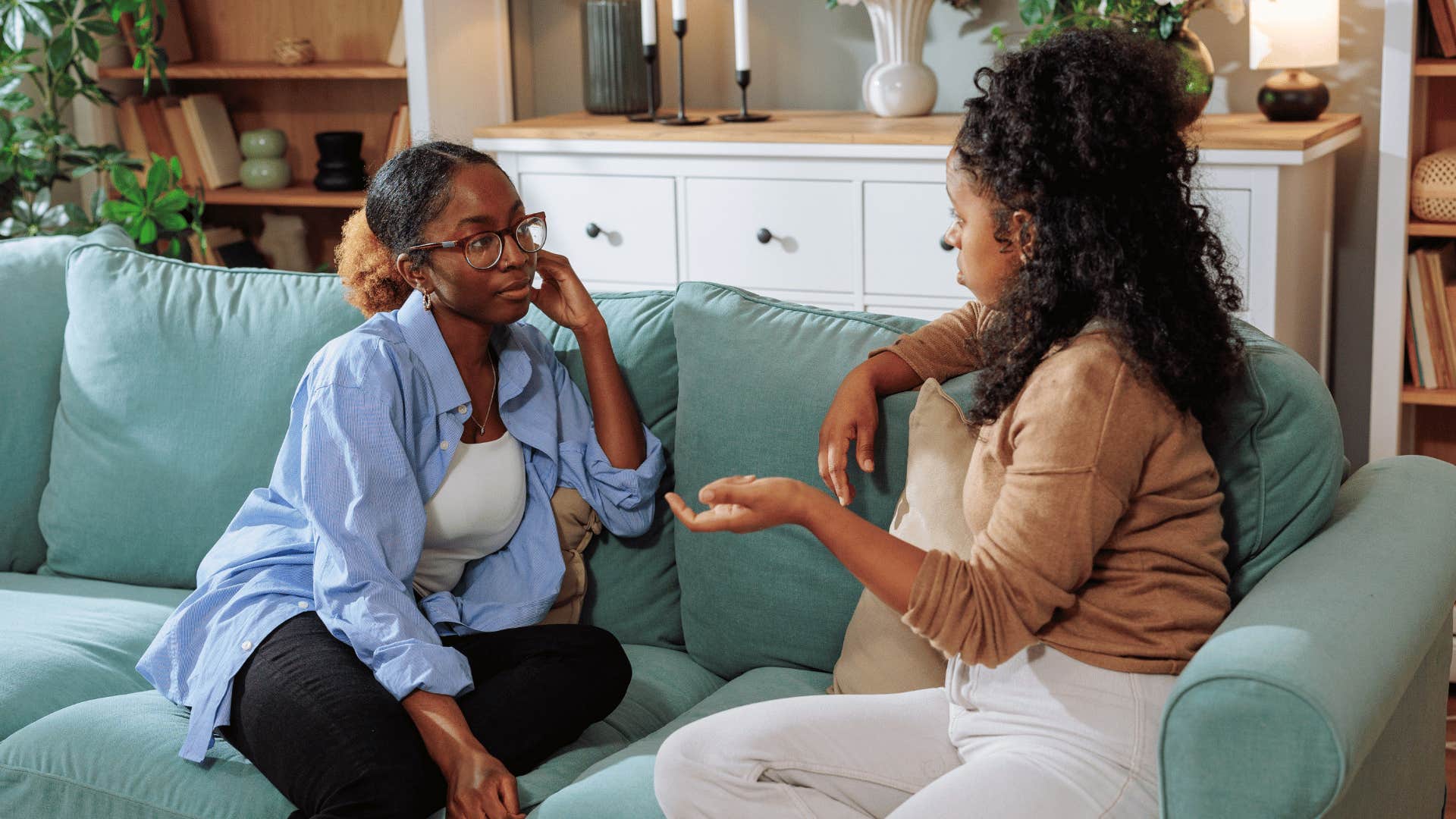10 Phrases People With Bad Social Skills Use Without Realizing
Improve your social skills by eliminating one phrase at a time.
 Samuel Ponce | Shutterstock
Samuel Ponce | Shutterstock Social skills directly impact the way people interact with each other. Strong social skills can help ease tension when meeting new people, while poor social skills can make it difficult for someone to gauge what to say or not say correctly.
The American Psychological Association defines social skills as “a set of learned abilities that enable an individual to interact competently and appropriately in a given social context.” They note that social skills often depend on cultural context. In Western cultures, social skills include assertiveness, emotional regulation, interpersonal problem-solving, and communication.
Because social skills can be subjective, people with bad social skills use specific phrases without realizing it. People can improve their social skills with practice and by paying close attention to other people’s reactions to what they’re saying.
Here are 10 phrases people with bad social skills use without realizing:
1.‘I’m just being honest’
 fizkes | Shutterstock
fizkes | Shutterstock
A phrase people with bad social skills use without realizing is “I’m just being honest.” They say this phrase to justify their communication style, which tends to be blunt and straightforward in a way that often comes off as being rude. Being honest is generally considered a positive trait, yet being honest just for honesty's sake, without considering the emotional consequences, can hurt others.
Radio host Bernard Meltzer, who ran an advice call-in show from 1967 through the 1990s, once said, “Before you speak, ask yourself if what you are going to say is true, is kind, is necessary, is helpful. If the answer is no, maybe what you are about to say should be left unsaid.
People with bad social skills often frame hurtful comments as expressions of truth, yet as Meltzer pointed out, just because a statement is true doesn’t mean it has to be shared.
2.‘Why can’t you take a joke?’
 Antonio Guillem | Shutterstock
Antonio Guillem | Shutterstock
Another phrase people with bad social skills use without realizing it is, “Why can’t you take a joke?” They usually pose this question as a defense mechanism after saying something harmful. While dark humor is valuable in helping people navigate difficult emotions, there’s a distinct difference between using humor to cope and being cruel.
People with bad social skills often justify the comments by saying they were only kidding, then asking, “Why can’t you take a joke?” The question is a way to shift blame, as though the person who feels offended is actually at fault. It serves to minimize and invalidate their feelings. While someone with bad social skills might not have meant to be hurtful on purpose, it’s still up to them to hold themselves accountable for what they’ve said rather than make the other person responsible for their reaction.
3.‘You look tired’
 Kmpzzz | Shutterstock
Kmpzzz | Shutterstock
Telling someone they look tired is another example of a phrase people with bad social skills use to realize. Saying, “You look tired,” is more of an insult than an expression of care or concern. This phrase emphasizes a lack of social competence, which could explain why someone might use it without considering its impact.
According to the American Psychological Association, social competence is “the ability to evaluate social situations and determine what is expected or required; to recognize the feelings and intentions of others; and to select social behaviors that are most appropriate for that given context.”
A person without social competence might not understand that saying “You like tired” is more likely to be interpreted as an insulting statement on someone’s physical appearance than an expression of kindness.
4.‘You don’t get it’
 Dima Berlin | Shutterstock
Dima Berlin | Shutterstock
A phrase people with bad social skills use without realizing is “You don’t get it.” Someone might say this phrase in response to another person’s attempt to empathize with them, declaring, “You don’t get it,” when they try to offer advice or emotional support.
Using the phrase “You don’t get it” shuts people out. It’s often an indication of low emotional intelligence, along with bad social skills. Psychologist Nick Wignall explained that people with low emotional intelligence struggle to identify and understand their feelings, noting that “improving your emotional intelligence is often about what you do less of, not more of.”
People with low emotional intelligence often blame other people for their own feelings and are highly critical.
“Criticizing others is often an unconscious defense mechanism aimed at alleviating our insecurities,” Wignall stated. He pointed out that being critical isn’t always negative, as being able to “think carefully and critically about the world around us is a vital skill. It helps us navigate the world and our relationships objectively.”
“But too much criticism — especially the habit of being critical of others — can lead to the opposite of objectivity: it can make us narrow-minded and blind, especially to ourselves,” he concluded.
Saying “You don’t get it” to someone who’s trying to see outside their perspective and create an emotional connection is something people with bad social skills do without realizing it.
5.‘Just to play devil’s advocate’
 insta_photos | Shutterstock
insta_photos | Shutterstock
People with bad social skills often use the phrase " just to play devil’s advocate” without realizing it. They use it during intellectual debates or arguments to gain the upper hand or pose hypothetical situations that don’t contribute to the larger conversation.
People with bad social skills say they’re “just playing devil’s advocate” when they bring up a contrarian point. The phrase is often an excuse to be argumentative or harshly critical without any purpose other than being critical. Relying on this phrase repeatedly can be a sign that someone was raised without good manners or that they lack empathy and compassion for people who might be hurt by what they’re saying.
6.‘Why do you care so much?’
 Cast Of Thousands | Shutterstock
Cast Of Thousands | Shutterstock
People with bad social skills use the phrase “Why do you care so much?” without realizing just how dismissive it is of other people’s feelings and values. A major part of having strong social skills involves assessing other people’s emotional states, and asking someone why they care so much can seem aggressive or unempathetic.
Having bad social skills can directly impact the quality of people’s relationships. According to an article published by the Association for Behavioral and Cognitive Therapies, problems within social relationships can affect people’s sense of well-being throughout their lives. Children who are excluded or teased by their peers tend to have academic difficulties, long-lasting social problems, and mental health struggles.
Adults who have poor social skills have less success and satisfaction in their romantic relationships, which can make them feel very lonely and socially isolated.
Empathy is a skill that can be learned. Being more empathic starts with recognizing other people’s emotions and accepting them as valid. Even if a person with bad social skills doesn’t understand why someone “cares so much,” they can acknowledge their emotional reality, which can help close the understanding gap between them.
7.‘I told you so’
 fizkes | Shutterstock
fizkes | Shutterstock
“I told you so” is a phrase people with bad social skills use without realizing it. They might not understand the full gravity of telling someone, “I told you so,” which can make them sound like they’re being smug or superior. No one particularly likes being wrong. Making mistakes can feel uncomfortable and shameful, so saying “I told you so” isn’t a productive or kind response.
Holding space for people when they’ve messed up requires someone to show compassion, not assign blame. Saying “I told you so” makes people feel worse about themselves. Instead of using this phrase, remind the person that everyone makes mistakes, and aiming for repair is the best step forward.
8.‘I wouldn’t do that if I were you’
 Nicoleta Ionescu | Shutterstock
Nicoleta Ionescu | Shutterstock
People with bad social skills use the phrase “I wouldn’t do that if I were you” without realizing that it implies that they think they’re better than the other person. This phrase implies that they have a big ego and always think they know the right answer.
Saying, “I wouldn’t do that if I were you,” is a condescending phrase that doesn’t help people. It’s a judgmental statement rather than an offer of support or guidance. People with bad social skills often don’t understand that what they say makes others feel judged or disregarded. Asking someone if they want advice is a better approach than just declaring, “I wouldn’t do that if I were you.”
9.‘Everyone knows that’
 voronaman | Shutterstock
voronaman | Shutterstock
“Everyone knows that” is a phrase people with bad social skills use without realizing it. They usually say this phrase to show how much brighter they are than other people, as it implies that whoever they’re talking to lacks common sense. This phrase creates an “us versus them” mentality and conveys that the other person has low intelligence.
Everyone has different strengths and areas where they know more than others. What some people accept as common sense might be new information for others. Using the phrase “Everyone knows that” is a disrespectful and harsh way to call someone out, and it’s a sign of having bad social skills.
10.‘This is just who I am’
 bbernard | Shutterstock
bbernard | Shutterstock
People with bad social skills use the phrase “This is just who I am” without realizing that it sounds impolite and self-centered. The phrase functions as a way for someone to avoid taking responsibility for their behavior, especially when they’ve caused harm or hurt others.
The phrase indicates a lack of self-awareness and reflects poorly on the person saying it.
Life coach Debra Smouse defined self-awareness as “the ability to observe ourselves and understand why we react and how we behave in our lives.”
“Awareness is not only accepting what we discover about ourselves, but it also helps us make informed decisions about the changes we want to make in our lives,” she continued. “Awareness is the ability to be honest about our weaknesses and strengths. It's a tool that allows us to better manage our thoughts, motivations, and emotions.”
Cultivating a deeper self-awareness means looking inside yourself and asking questions about who you are, what you value, and how you want to present yourself to other people.
“Learning to improve self-awareness allows us to make better choices and curate a lifestyle that makes us feel engaged and alive,” Smouse concluded.
People with bad social skills tend to avoid self-reflection, even though examining how they relate to others can help them create stronger connections.
Alexandra Blogier is a writer on YourTango's news and entertainment team. She covers social issues, pop culture analysis, and the entertainment industry.

